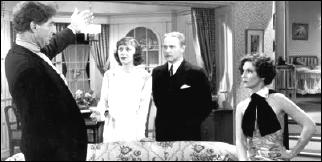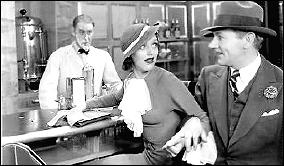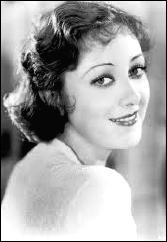Tue 16 Aug 2011
Movie Review: FRIENDS OF MR. SWEENEY (1934).
Posted by Steve under Films: Comedy/Musicals , Reviews[5] Comments

FRIENDS OF MR. SWEENEY. Warner Brothers, 1934. Charlie Ruggles, Ann Dvorak, Eugene Pallette, Robert Barrat, Berton Churchill, Dorothy Burgess, Dorothy Tree, Harry Tyler. Based on a novel by Elmer Davis. Director: Edward Ludwig.
Charlie Ruggles is the true star of this one, even though Friends of Mr. Sweeney was recently shown as part of a day-long salute on TCM to Ann Dvorak (pronounced with a silent D). As an editorial writer, over the years, he’s become hidebound and downtrodden, and totally subservient to his boss at the weekly magazine where he plies his trade, even to the point where he’s resigned to composing a favorable piece on a politician he knows is crooked.

As his trusty assistant, Ann Dvorak can only look on sadly, and with unrequited fondness (which she obvious wishes could be more). Enter Eugene Pallette, Charlie’s old buddy at college, where they were on the football team together, and a couple of more high-spirited and fun-loving buddies you would be hard-pressed to find.
Maybe you can take it from here. First a badly interrupted dinner date with his secretary, then out on the town as a foursome, posing as a friend of a fictitious Mr. Sweeney to enter one of the poshiest casinos in town, where all hilarity breaks out, then back to office while the building is being robbed (all part of the story line).

The fussy Charlie Ruggles I always find amusing, especially in situations where he finds himself enjoying becoming a wildcat again. I often need only a small dose of Eugene Pallette to get me through the week, however, and unfortunately this is more than a small dose. (No offense intended.)
Ann Dvorak, only 22 when this movie was made, was destined to have a career consisting only small parts or larger roles in minor movies like this one, but like this one, her beauty and engaging personality wins me over every time. (One scene is which she is wearing nothing but lingerie is rather revealing for a movie made with the Code in effect.)
Note: You can see what I mean by that last parenthetical statement — as well as everything else I’ve said — by checking out the original trailer that’s available on the TCM website.
August 16th, 2011 at 10:25 pm
I like Charlie Ruggles also. Eugene Pallette is an example of an actor earning a living because of his strange voice, otherwise he would never have been a success.
Too bad today’s Hollywood doesn’t make fast moving comedies like this one more often. It’s been quite a while since I’ve been to a movie theater.
August 16th, 2011 at 10:57 pm
Charlie Ruggles was fairly important in the business for a long time. Not a star, but tops at what he does, or did. And Dvorak was marginally more important that you’ve described, and might be better remembered today had she not gone off to England during the war. To see her at her most attractive, post-war, have a look at Abilene Town.
August 17th, 2011 at 11:29 am
Re Eugene–His voice is not the key to his career. As a young, thin man, he had a silent film career. Played Aramis with Doug, Sr. In The three Musketeers. Many other credits.
August 18th, 2011 at 10:45 am
Barry
You’re right. In his silent films days, it is hard to believe, but Pallette was slim and athletic.
When sound came in, though, his deep bassoon voice changed his career considerably, to largely comic roles.
But you’re also right in that there was more to him than that. Here’s a long quote from his Wikipedia page:
http://en.wikipedia.org/wiki/Eugene_Pallette
BBC commentator Dana Gioia gave this extensive description of Pallette’s onscreen appeal:
“Pallette could anchor a scene just by walking downstairs. When he enters Preston Sturges’s The Lady Eve (1941), trotting down to breakfast singing a merry ballad, he embodies all the small human hopes that screwball comedy exists to shatter…. The mature Pallette character is a creature of provocative contradictions — tough-minded but indulgent, earthy but epicurean, relaxed but excitable. His grit and gravel voice sounds simultaneously tough and comic. Even his corpulence is two-sided. In his best films Pallette made his fatness seem like a sign of moderation and common sense. As Friar Tuck in The Adventures of Robin Hood (1938) or Fray Felipe in The Mark of Zorro (1940), he shows that a fat priest is no heartless zealot but understands the sins of the flesh. Playing a tubby millionaire like the beer baron in The Lady Eve or Alexander Bullock in My Man Godfrey (1936), Pallette uses his girth to create a common touch. Stuffed into a tuxedo that seems perpetually near bursting, he seems more down-to-earth than the stylish high society types who surround him. Even Pallette’s villains, like the corrupt and cynical politico Chick McCann in Mr. Smith Goes to Washington, are immensely likeable. Pushed too far, Pallette confidently uses his weight for physical force. When Bullock finally evicts the free-loading Carlo (Mischa Auer) in My Man Godfrey, we are not so much surprised as reassured by Pallette’s manly strength. In battle his sword-wielding Friar Tuck is a glory to behold. Pallette may have gained weight, but he never lost his underlying virility.”
August 18th, 2011 at 6:03 pm
Steve–Whoever put that thing together was a real student of this stuff. Good going, and thanks.